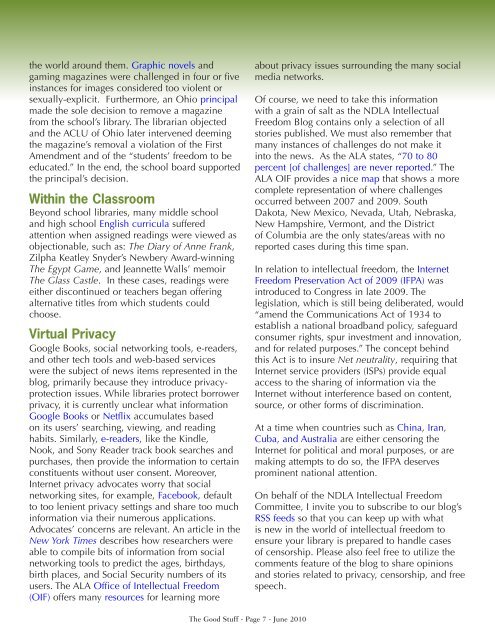INSIDE - North Dakota Library Association
INSIDE - North Dakota Library Association
INSIDE - North Dakota Library Association
You also want an ePaper? Increase the reach of your titles
YUMPU automatically turns print PDFs into web optimized ePapers that Google loves.
the world around them. Graphic novels and<br />
gaming magazines were challenged in four or five<br />
instances for images considered too violent or<br />
sexually-explicit. Furthermore, an Ohio principal<br />
made the sole decision to remove a magazine<br />
from the school’s library. The librarian objected<br />
and the ACLU of Ohio later intervened deeming<br />
the magazine’s removal a violation of the First<br />
Amendment and of the “students’ freedom to be<br />
educated.” In the end, the school board supported<br />
the principal’s decision.<br />
Within the Classroom<br />
Beyond school libraries, many middle school<br />
and high school English curricula suffered<br />
attention when assigned readings were viewed as<br />
objectionable, such as: The Diary of Anne Frank,<br />
Zilpha Keatley Snyder’s Newbery Award-winning<br />
The Egypt Game, and Jeannette Walls’ memoir<br />
The Glass Castle. In these cases, readings were<br />
either discontinued or teachers began offering<br />
alternative titles from which students could<br />
choose.<br />
Virtual Privacy<br />
Google Books, social networking tools, e-readers,<br />
and other tech tools and web-based services<br />
were the subject of news items represented in the<br />
blog, primarily because they introduce privacyprotection<br />
issues. While libraries protect borrower<br />
privacy, it is currently unclear what information<br />
Google Books or Netflix accumulates based<br />
on its users’ searching, viewing, and reading<br />
habits. Similarly, e-readers, like the Kindle,<br />
Nook, and Sony Reader track book searches and<br />
purchases, then provide the information to certain<br />
constituents without user consent. Moreover,<br />
Internet privacy advocates worry that social<br />
networking sites, for example, Facebook, default<br />
to too lenient privacy settings and share too much<br />
information via their numerous applications.<br />
Advocates’ concerns are relevant. An article in the<br />
New York Times describes how researchers were<br />
able to compile bits of information from social<br />
networking tools to predict the ages, birthdays,<br />
birth places, and Social Security numbers of its<br />
users. The ALA Office of Intellectual Freedom<br />
(OIF) offers many resources for learning more<br />
The Good Stuff - Page 7 - June 2010<br />
about privacy issues surrounding the many social<br />
media networks.<br />
Of course, we need to take this information<br />
with a grain of salt as the NDLA Intellectual<br />
Freedom Blog contains only a selection of all<br />
stories published. We must also remember that<br />
many instances of challenges do not make it<br />
into the news. As the ALA states, “70 to 80<br />
percent [of challenges] are never reported.” The<br />
ALA OIF provides a nice map that shows a more<br />
complete representation of where challenges<br />
occurred between 2007 and 2009. South<br />
<strong>Dakota</strong>, New Mexico, Nevada, Utah, Nebraska,<br />
New Hampshire, Vermont, and the District<br />
of Columbia are the only states/areas with no<br />
reported cases during this time span.<br />
In relation to intellectual freedom, the Internet<br />
Freedom Preservation Act of 2009 (IFPA) was<br />
introduced to Congress in late 2009. The<br />
legislation, which is still being deliberated, would<br />
“amend the Communications Act of 1934 to<br />
establish a national broadband policy, safeguard<br />
consumer rights, spur investment and innovation,<br />
and for related purposes.” The concept behind<br />
this Act is to insure Net neutrality, requiring that<br />
Internet service providers (ISPs) provide equal<br />
access to the sharing of information via the<br />
Internet without interference based on content,<br />
source, or other forms of discrimination.<br />
At a time when countries such as China, Iran,<br />
Cuba, and Australia are either censoring the<br />
Internet for political and moral purposes, or are<br />
making attempts to do so, the IFPA deserves<br />
prominent national attention.<br />
On behalf of the NDLA Intellectual Freedom<br />
Committee, I invite you to subscribe to our blog’s<br />
RSS feeds so that you can keep up with what<br />
is new in the world of intellectual freedom to<br />
ensure your library is prepared to handle cases<br />
of censorship. Please also feel free to utilize the<br />
comments feature of the blog to share opinions<br />
and stories related to privacy, censorship, and free<br />
speech.


